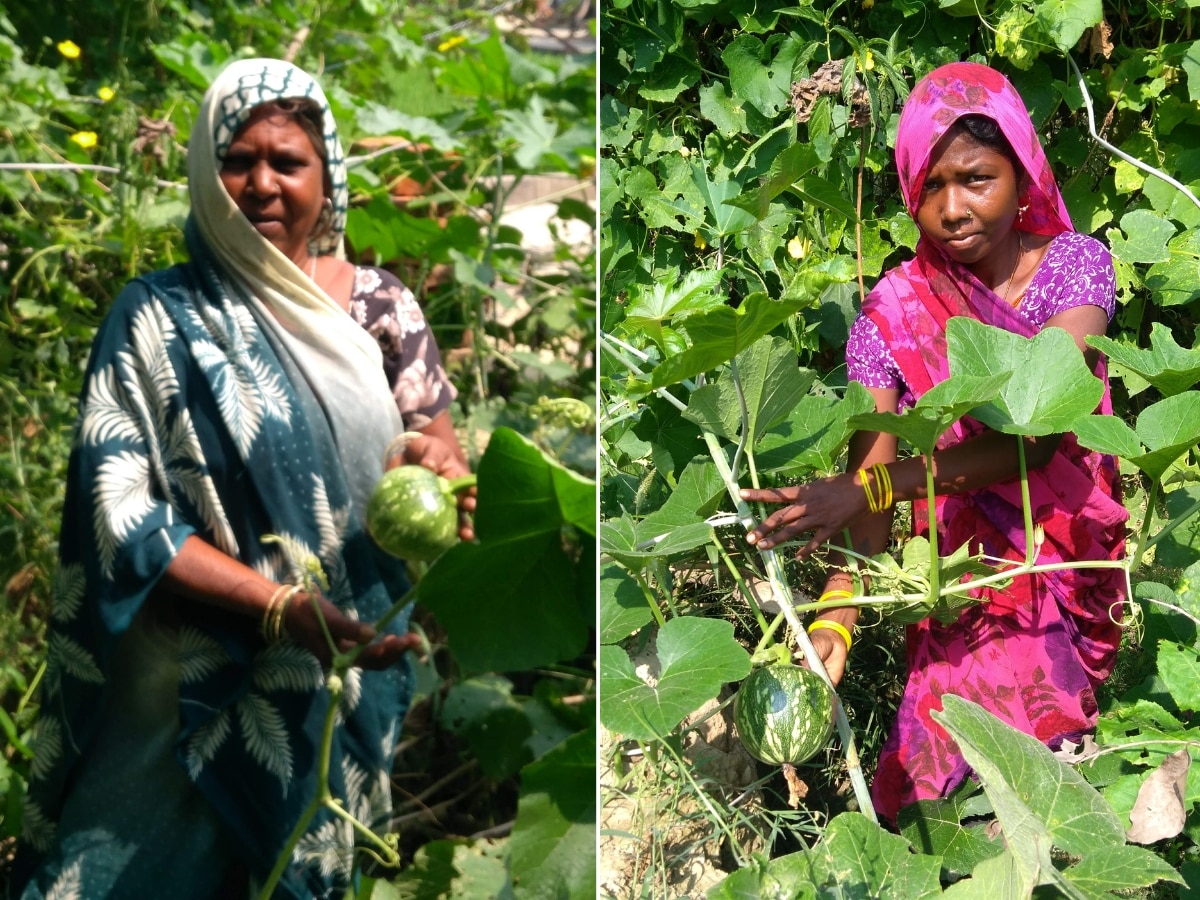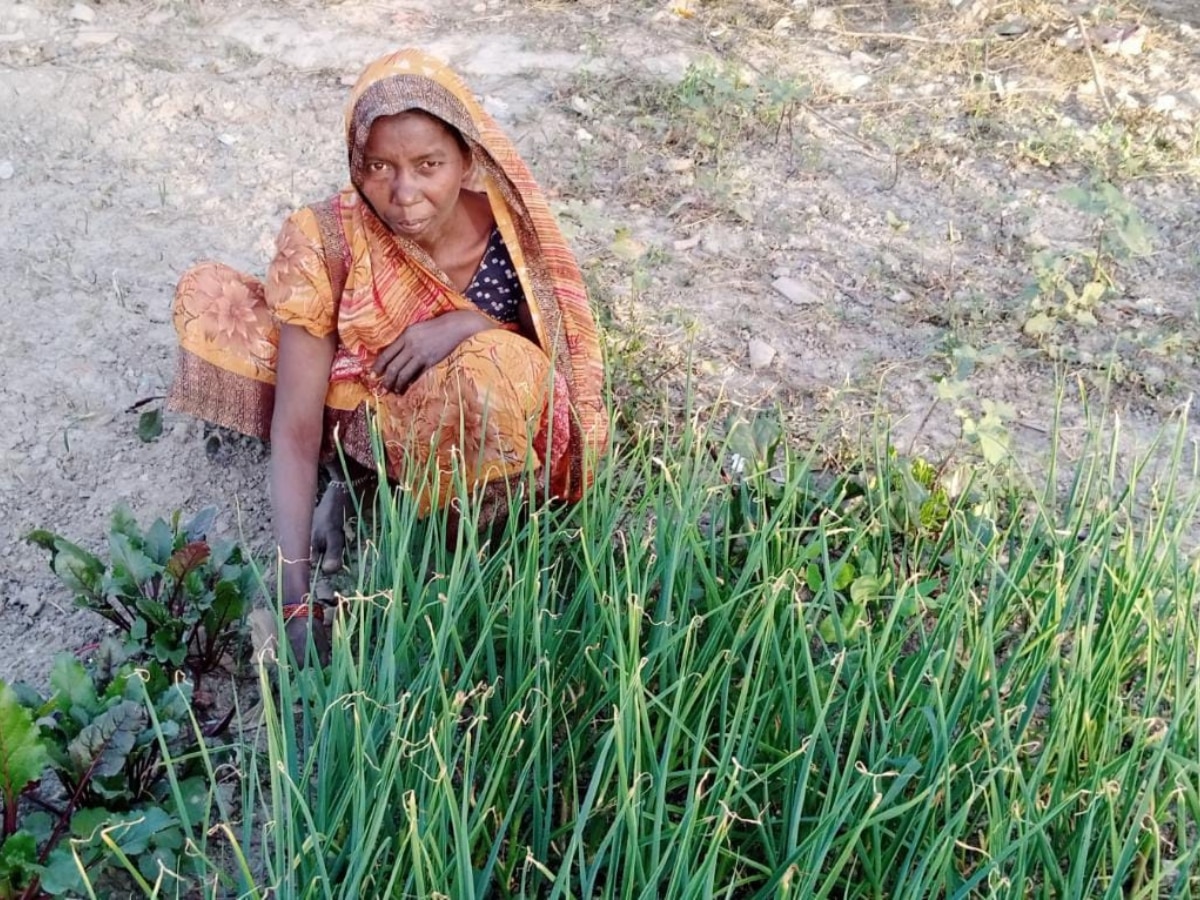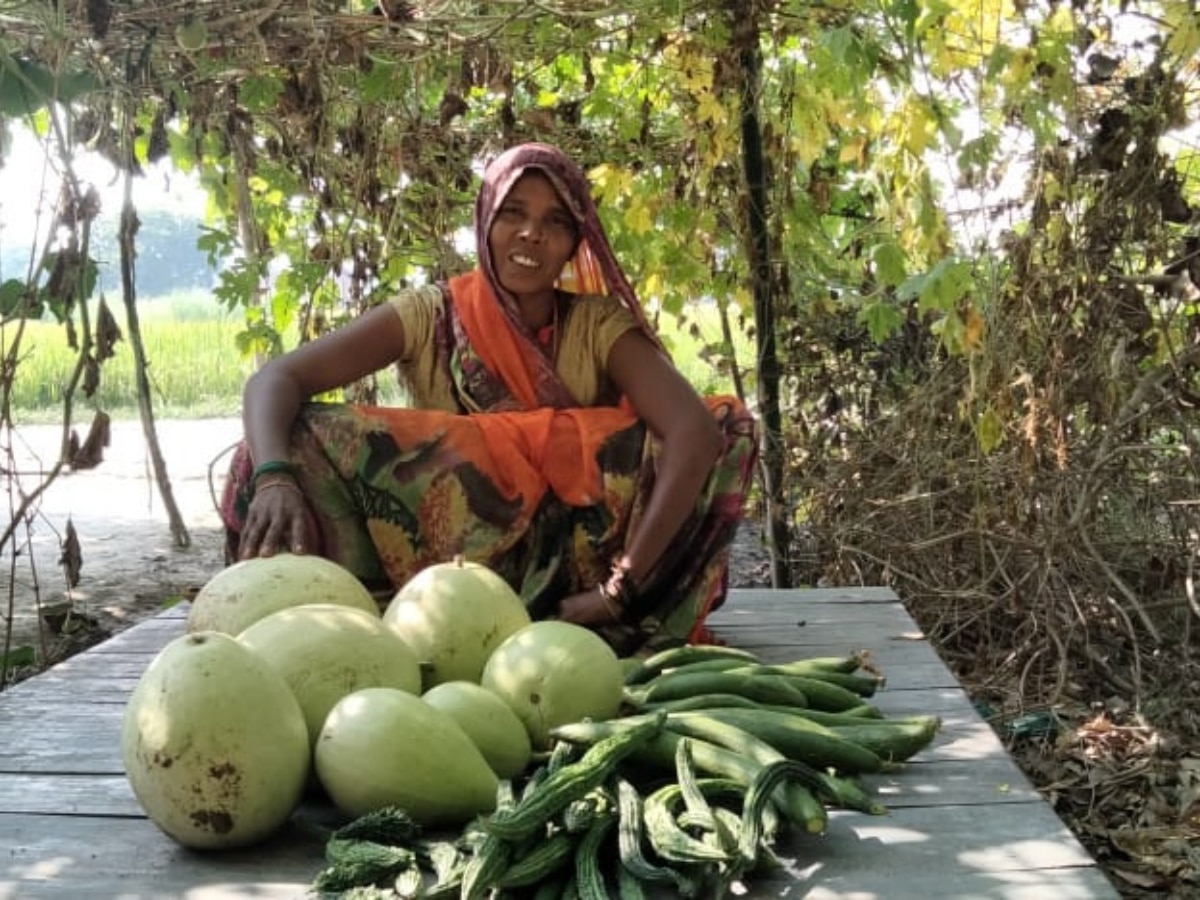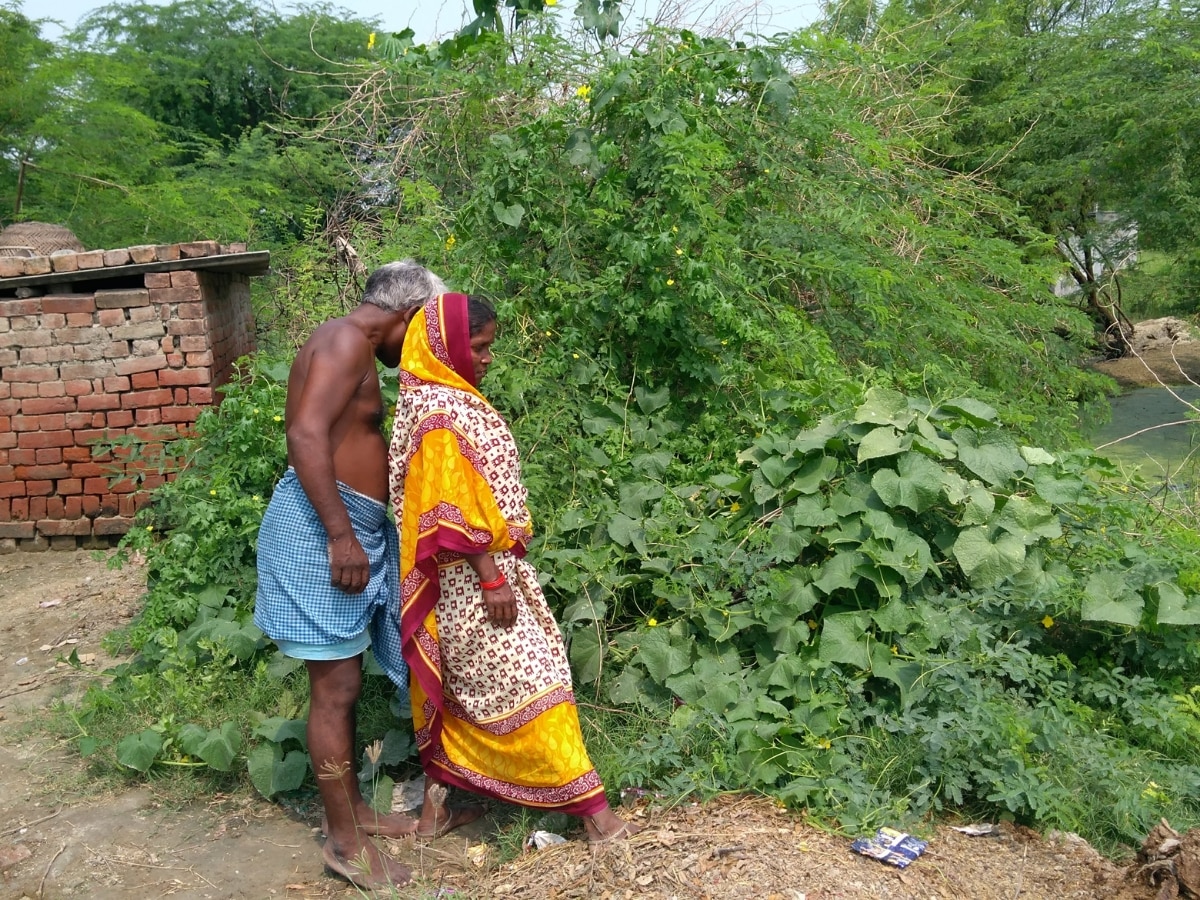Landless Labourers And Beggars To Entrepreneurs: Big Musahar Leap Through Kitchen Gardens
The Musahar Story Part IV: With some hand-holding, landless Musahars are growing their own vegetables, eating and selling them too.
Musahars, literally translated as rat killers and rat eaters, mostly live in certain regions of eastern Uttar Pradesh and the adjacent Bihar districts. Even among the Scheduled Castes, they are considered the lowest‚ to the extent even other Dalits see them as 'untouchables' and their colonies are only politically seen as part of certain villages. The Musahars live in ‘tolis’, or ghettos, outside their designated villages. Musahars, estimated at some 30 lakh in Bihar and 10 lakh in Uttar Pradesh, in most areas are landless labourers who work at agricultural farms and brick kilns along with their children. They remain without work more than half a year.
The community has now found an innovative solution at self-empowerment — kitchen gardens.
"They are landless, yes, but they have spare pieces of land available around their homes, in the form of weeds or dumpyards. We made them cultivate the land. We provided seeds for seasonal vegetables. This took care of two things. One, they often slept hungry and when they started getting some wheat and rice as part of the public distribution system (PDS), there was nothing to accompany this. So, the vegetables we helped them grow helped them immensely. By now, many of them are not only growing vegetables to eat for themselves but also sell in the market,” says Shruti Nagvanshi of the People’s Vigilance Committee for Human Rights (PVCHR), a civil rights organisation working towards elevating the living standards of the Musahar community.
Most Musahars, including their children, are severely malnourished. “But wherever they have developed their own vegetable gardens, one can see a marked change not only in their health but also in their outlook. There is (now) a sense of hope. Otherwise, most Musahars you speak to would appear resigned to their fate,” says Nagvanshi. As a catalytic effect, the children have more enthusiasm to attend schools, according to her.
“Another big impact is that Musahars who are self-employed this way have acquired more social respectability. There are cases where they distribute extra vegetables even to their high-caste villagers and Muslims. Otherwise, none of the latter would touch them. We discovered how even a small piece of useless land can bring about economic as well as social recovery,” explains Nagvanshi, who runs PVCHR with husband Lenin Raghuvanshi.
For those who haven’t seen the state of the Musahars, this may not sound a big deal unless they know that most Musahars have no job cards under the Mahatma Gandhi National Rural Employment Guarantee (MGNREGA), or even Aadhaar cards. And even for those who have the job cards, it mostly doesn’t get them any work.
“We began the initiative in 2018 as a pilot in some villages in Varanasi district with our own resources, but by now the kitchen garden project has already covered 3,000 families,” says Lenin Raghuvanshi.
He says the project picked up aggressively in 2022 after the International Rehabilitation Council for Torture Victims (IRCT) provided livelihood support for holistic rehabilitation of the Musahars. In 2022 alone, PVCHR volunteers distributed seasonal vegetable seeds to as many as 2,261 families in Varanasi, Sonbhadra and Badaun districts in Uttar Pradesh. Raghuvanshi says: “As much as 36,536 kg vegetables were grown last summer and 2,523 kg of these were sold by the Musahars in the market.”
In all, these families earned a princely Rs 26,775 from this sale in the summer of 2022. They spent this money on clothes for their children and their education besides for household commodities. A permanent seed bank has been set up now in Anei village in Varanasi district. Raghuvanshi said 45 fruit and timber plants have been planted in the village.

Single Musahar Woman's Journey To Self-Dependence
Meet Manta Banwasi, a 40-something widow who had brought her eldest daughter Nisha and her husband Raja Banvasi to stay with her in her half-constructed half-thatched home in the Musahar ghetto at Anei village in Varanasi’s Baragaon block to ensure all of them could work together and help raise the latter's three kids, daughter Sundari and sons Kaushal and Suraj.
All three were casual labourers and used to take along the children with them for work. Most often they would eat roti or rice with salt since the public distribution system only gives fixed quota of wheat and rice.
Similarly, like most other Musahars, they would collect the waste at vegetable markets and cook it to eat with roti or rice. Sometimes, they would bring chicken feathers and some meat stuck on it from outside shops, restaurants or kiosks to eat.
Manta had never even thought that anything could grow around her home surrounded by wild acacia trees, garbage and weeds. “Initially, I feared that even if we cleaned up the place and planted vegetables as suggested by the sanstha (NGO), cattle, dogs and pigs roaming around would eat up all of it since we would have to go to other villages in search of work or begging,” she says.
Since PVCHR was already working on the kitchen garden concept in Anei village, they convinced her that her small piece of land with vegetables will be guarded by the volunteers.
Finally, the weeds and the garbage were cleared and Manta was given seeds of kumhdi (a local variety of pumpkin), nanua (sponge gourd) and kareli (bitter gourd). “Soon, we all started taking turns in protecting and taking care of the garden,” Manta shares with pride.
She says that once the plants started growing, they were mounted on the wild acacia bushes as advised by the NGO’s volunteers.
The plants gradually developed and spread by creeping on the acacia bushes. Soon, all three plants started yielding fruits. “We decided that once we have 5 to 7 pieces of the fruits, we will cook them. The kumhdi assumes a weight of 2 to 2.5 kg in three to four days. Gradually, we all started eating all the vegetables grown by us in turns,” Manta says.
Not only this, the family now also sells their produce. Manta’s kitchen garden started producing huge quantities of kumhdi and soon the spot itself became a shop of sorts for the family.
She started selling the local pumpkin for Rs 20-30 a piece, depending on the size and the weight in the same Musahar settlement.
"Soon the word spread that we sell good kumhdi at cheaper rates than the market and we now get buyers from surrounding villages also," Manta recalls. She estimates she must have sold nearly 60 pieces of the vegetable out of the three quintals they had produced. "We produced 25 kg of sponge gourd and 12 kg of bitter gourd,” she adds.
With the money they earned, they brought other kitchen items like cooking oil and a variety of spices. “And proper clothes for the children to be able to send them to school,” says Manta.

Savitri’s Little Vegetable Kingdom
Then there is Savitri, in her thirties, a widow in Puarikhurd village in Varanasi district’s Harhua block who could never think of eating vegetables or getting them for her three daughters. There was no question of buying milk and milk products.
She sustained herself and the daughters with whatever casual work that came her way until the volunteers of PVCHR provided her with free seeds for bitter gourd (karela), sponge gourd (nenua) and two types of pumpkins.
"My kitchen garden produced 20 kg nenua, 15 kg kohda, 20 kg kaddu and 10 kg karela. Selling them in the market, I could easily fetch Rs 150 to Rs 200 everyday, while we could all eat these vegetables. And the homegrown ones taste very nice,” she says.
Savitri recalls how she initially used to distribute these homegrown vegetables free to neighbours. “Gradually, they started buying them from me. People of nearby villages also buy. Now, I earn Rs 1,500 to Rs 2,000 a month, which takes care of the family’s eating needs. Plus whatever other work I get.”
Earlier, she could rarely buy vegetables for home with almost no money for it. “But now, ever since I have been on my own due to this vegetable production, life has become much easier than before,” Savitri smiles.
PVCHR volunteers said they could see a marked difference in the health of Savitri and her three daughters, who also manage to go to school now.

Growing Their Veggies And Eathing Them Too!
If Manta is among the hundreds of individual families who have adopted the kitchen garden concept on the negligible pieces of land around their home, the entire 22-family Musahar ghetto in Barhikala village on the border of Varanasi and Jaunpur districts has established community gardens.
Shruti Nagvanshi says the entire Musahar settlement here was dead against the idea of a kitchen garden, having assumed that no plantations were possible in their locality. Most families were either unemployed or managed to get jobs only a few months in a year and made do with whatever they had, often going hungry.
The Musahar settlement in Barhikala is located in the southern part of the village in the submergence area on the banks of the Sharda tributary canal, though they live at some height above the submergence level. Because of the lack of resources at their husbands’ homes, many married women here have come back to live at their maternal homes. And the community is deprived of the basic facilities because of their location.
Says Nagvanshi: "It was difficult to convince the villagers that a kitchen garden was possible in their locality. They were then shown the village community land, which was being used to throw garbage and weeds had grown there. Besides this, we cited the example of another village where this was done. Finally, they agreed.”
The community members were involved and taught how to plant seeds and saplings.
Nagvanshi cites the instances of Basanti, Vimla, Israwati, Patti, Sanju and Vidya who took care of their kitchen garden, which started yielding several green vegetables.
Isravati Banwasi's kohdi (small-sized green pumpkin) plant yielded so much fruit that she cooked it for herself, and sent her daughter back to her in-laws' house with plenty of kohdi. The people in the community started demanding it and even took it to their relatives.
"My kitchen garden seems to have become everyone’s property. They pluck the kohdi from my garden often without asking me whenever they need it,” Isravati happily shares.
Shruti adds: “For the first time, the people of the township ate pesticide-free vegetables from their kitchen garden. This time when the seeds were distributed for the kitchen gardens here, people were asking for a variety of seeds for other types of vegetables too in the same land.”

Genesis of Kitchen Garden Idea
Lenin Raghuvanshi points out that most Musahars work in fields owned by others or brick kilns or migrate to the cities, and a majority of them work as bonded labour, along with their children. “Their workplaces in brick kilns or cities expose and force their children to work even in hazardous industries. During my visits to their homes, I noticed the irony of how these communities live right next to the upper castes. Rice fields owned by the rich upper caste people surround their homes. Some of their women just need to cross one street to go and clean the houses of the upper castes. Most of it is bonded labour.”
This is where the kitchen garden idea spawned from, though they are all landless people. Now with self-reliance comes the priority of sending children to school. “We have got hundreds of children enrolled in schools and tracking them to ensure they don’t drop out,” he says. Raghuvanshi claims that many Musahar communities, which have been supported by People’s Vigilance Committee on Human Rights (PVCHR), have changed their diet, and now can afford to eat pork, chicken and fish.
The PVCHR, with the support of the New Zealand High Commission, organised a meeting with the marginalised people and encouraged them to utilise the vacant places near their house. They were informed about the importance and process of kitchen gardening. In most households, they don’t get any nutritional food and people are found to be suffering from a variety of diseases. In such cases, kitchen gardening can help create a fresh environment besides providing the people with essential micronutrients. “After a discussion with the community, the people drew up a list of vegetables to be grown based on taste and interests,” Raghuvanshi adds.
Darshan Desai is a veteran journalist currently based out of Gujarat. This article has been supported by Work: No Child’s Business (WNCB) alliance
#Musahar #dalit #Livelihood #JMN #KitchenGarden


No comments:
Post a Comment